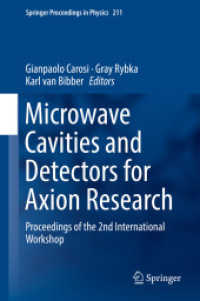- ホーム
- > 洋書
- > 英文書
- > Cinema / Film
Full Description
One of the first books to explore Russian cinema in the new millennium, this volume captures the emergence of a new cinematic sensibility and interprets it through the framework of the symbolic mode. Analysing films by established directors such as Sokurov, Zviagintsev and Zel'dovich, as well as lesser-known filmmakers like Balabanov, Fedorchenko and Kalatozishvili, Contemporary Russian Cinema: Symbols of a New Era explores the particular style of film presentation that has emerged in Russia since 2000, characterised by its use of highly abstract concepts and visual language. Whether directed towards a mystical world, or even towards an afterlife, the symbolic mode defines the emergence of a specific mindscape which has escaped previous representational forms and is intrinsically linked to Russia's dramatic political and economic development since the turn of the 21st century.
Contents
IntroductionChapter 1: Abstracted Subjectivity and Knowledge-Worlds: Aleksandr Sokurov's Taurus (2001)Chapter 2: The Lacking Sense of Cinema: Aleksandr Proshkin's The Miracle (2009)Chapter 3: Gatekeepers of (Non-)Knowledge: Aleksei Balabanov's Morphine (2008)Chapter 4: Symbolic Folds and Flattened Discourse: Andrei Zviagintsev's Elena (2010)Chapter 5: Non-Knowledge and the Symbolic Mode: Nikolai Khomeriki's A Tale About Darkness (2009)Chapter 6: The World and the Event: Kirill Serebrennikov's St. George's Day (2008)Chapter 7: A Plea for the Dead (Self): Renata Litvinova's Goddess: How I Fell in Love (2004)Chapter 8: Body in Crisis and Posthumous Subjectivity: Igor' Voloshin's Nirvana (2008)Chapter 9: The Difficulty of Being Dead: Aleksandr Veledinskii's Alive (2006)Chapter 10: Intentionality and Modelled Subjectivities: Aleksei Fedorchenko's Silent Souls (2010)Chapter 11: Abandoned Being: Mikhail Kalatozishvili's The Wild Field (2008)Chapter 12: Conclusions: Amplifications of Subjectivity: Aleksandr Zel'dovich's The Target (2010)FilmographyBibliographyIndex








